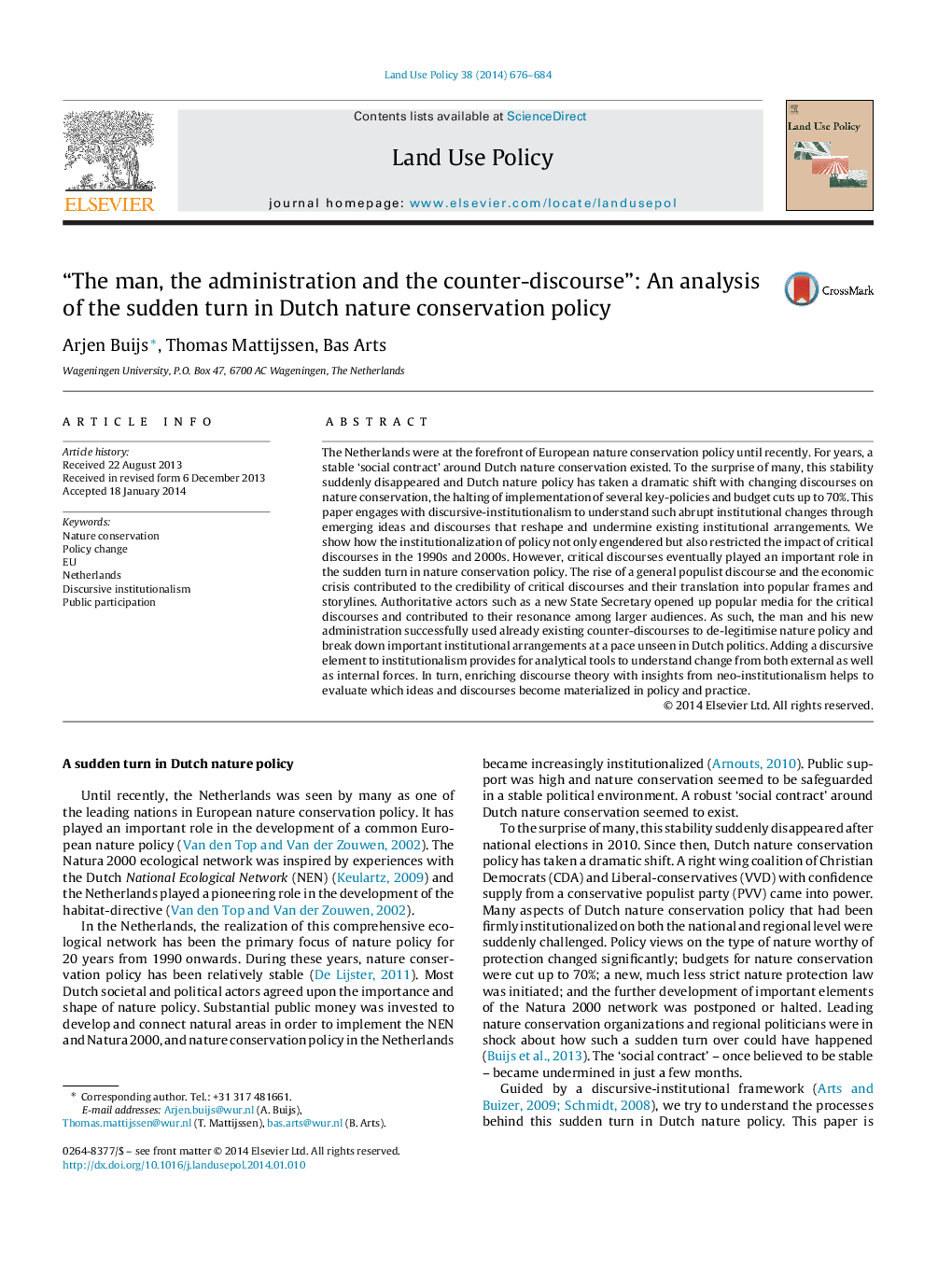| کد مقاله | کد نشریه | سال انتشار | مقاله انگلیسی | نسخه تمام متن |
|---|---|---|---|---|
| 6548878 | 160110 | 2014 | 9 صفحه PDF | دانلود رایگان |
عنوان انگلیسی مقاله ISI
“The man, the administration and the counter-discourse”: An analysis of the sudden turn in Dutch nature conservation policy
ترجمه فارسی عنوان
یک مرد، دولت و ضد گفتمان: تحلیلی از تغییر ناگهانی در سیاست حفاظت از طبیعت هلند
دانلود مقاله + سفارش ترجمه
دانلود مقاله ISI انگلیسی
رایگان برای ایرانیان
کلمات کلیدی
حفاظت از طبیعت، تغییر سیاست، اتحادیه اروپا، هلند، نهادگرایی دیسوری، مشارکت عمومی،
ترجمه چکیده
تا همین اواخر هلند در خط مقدم سیاست حفاظت از طبیعت اروپا قرار داشت. سالهاست که یک قرارداد پایدار اجتماعی در اطراف حفاظت از طبیعت هلند وجود دارد. به تعجب بسیاری از مردم، این ثبات به طور ناگهانی ناپدید شد و سیاست طبیعت هلندی با تغییر گفتمان در مورد حفاظت از طبیعت، توقف اجرای برخی از سیاست های کلیدی و کاهش بودجه تا 70 درصد تغییر چشمگیر یافته است. این مقاله با استدلال گفتاری-نهادگرایانه برای درک چنین تغییراتی ناگهانی نهادی از طریق ایده ها و گفتمان های نوظهور که تغییرات و تضعیف ساز و کارهای سازمانی موجود را درک می کند، درگیر است. ما نشان می دهیم که نهادینه سازی سیاست نه تنها باعث ایجاد، بلکه تاثیر گفتمان انتقادی در دهه های 1990 و 2000 شد. با این حال، گفتمان انتقادی در نهایت نقش مهمی در تحول ناگهانی سیاست حفاظت از طبیعت ایفا نمود. ظهور گفتمان عمومی پوپولیستی و بحران اقتصادی به اعتبار گفتمان انتقادی و ترجمه آن به فریم ها و داستان های محبوب کمک کرد. بازیگران معتبر مانند یک وزیر امور خارجه جدید، رسانه های عمومی را برای گفتمان انتقادی باز کردند و به تماشای آنها در بین مخاطبان بزرگ تر کمک کردند. به همین ترتیب، مرد و دولت جدیدش با استفاده از مخالفت های موجود در حال حاضر به عدم مشروعیت سیاست های طبیعت و شکستن ساز و کارهای مهم نهادی در سرعت غیر قابل مشاهده در سیاست هلندی. افزودن عنصر دیجیتالی به نهادگرایی ابزارهای تحلیلی را برای درک تغییر از نیروهای خارجی و همچنین نیروهای داخلی فراهم می کند. به نوبه خود، غنی سازی نظریه گفتمان با بینش از نئونستیزیالیسم به ارزیابی ایده ها و گفتمان ها در سیاست و عمل تبدیل می شود.
موضوعات مرتبط
علوم زیستی و بیوفناوری
علوم کشاورزی و بیولوژیک
جنگلداری
چکیده انگلیسی
The Netherlands were at the forefront of European nature conservation policy until recently. For years, a stable 'social contract' around Dutch nature conservation existed. To the surprise of many, this stability suddenly disappeared and Dutch nature policy has taken a dramatic shift with changing discourses on nature conservation, the halting of implementation of several key-policies and budget cuts up to 70%. This paper engages with discursive-institutionalism to understand such abrupt institutional changes through emerging ideas and discourses that reshape and undermine existing institutional arrangements. We show how the institutionalization of policy not only engendered but also restricted the impact of critical discourses in the 1990s and 2000s. However, critical discourses eventually played an important role in the sudden turn in nature conservation policy. The rise of a general populist discourse and the economic crisis contributed to the credibility of critical discourses and their translation into popular frames and storylines. Authoritative actors such as a new State Secretary opened up popular media for the critical discourses and contributed to their resonance among larger audiences. As such, the man and his new administration successfully used already existing counter-discourses to de-legitimise nature policy and break down important institutional arrangements at a pace unseen in Dutch politics. Adding a discursive element to institutionalism provides for analytical tools to understand change from both external as well as internal forces. In turn, enriching discourse theory with insights from neo-institutionalism helps to evaluate which ideas and discourses become materialized in policy and practice.
ناشر
Database: Elsevier - ScienceDirect (ساینس دایرکت)
Journal: Land Use Policy - Volume 38, May 2014, Pages 676-684
Journal: Land Use Policy - Volume 38, May 2014, Pages 676-684
نویسندگان
Arjen Buijs, Thomas Mattijssen, Bas Arts,
